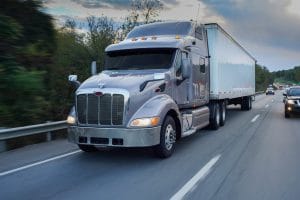The Dangers We Face Sharing the Road with Tractor-Trailers
 The road is a dangerous place, and tractor-trailers can make it ever more dangerous. Even though commercial trucks help the economy, they are the most dangerous vehicles on the roads of New Jersey. Between high rates of speed, impaired drivers, drowsiness and distractions, driver negligence is one of the biggest safety concerns there is.
The road is a dangerous place, and tractor-trailers can make it ever more dangerous. Even though commercial trucks help the economy, they are the most dangerous vehicles on the roads of New Jersey. Between high rates of speed, impaired drivers, drowsiness and distractions, driver negligence is one of the biggest safety concerns there is.
But it is not the only safety concern. Today, we wanted to take a look at some of the elements that go into sharing a road with an 18-wheeler, and what truckers must do to keep you and themselves safe.
The blind spots are bigger than you think
Large trucks have multiple blind spots. They are in the rear, on either side and sometimes even directly in front of the truck. There are times where you will not be able to avoid driving in the blind spot of a truck because of traffic volume, but when avoidable, be sure to stay away from the blind spots as much as possible. If you cannot see the truck driver in the side view mirror, the truck driver cannot see your vehicle.
Remember, though, that big trucks do come equipped with some safety technology that is designed to help drivers see you, even when you are in a blind spot. Every driver uses (or should use) blind spot mirrors, and many newer trucks come equipped with front and rear-facing cameras, to give the drivers a better view. If the driver fails to utilize this tech, or is engaging in risky or negligent driving behaviors, the driver and the trucking company can be held accountable for any injuries you sustain in a crash.
The dangers of underride and override
One of the biggest dangers of sharing the road with big trucks is the danger of underride or override. Underride occurs when a car hits a truck form behind or the side and slides underneath the truck, and often having the top of the vehicle ripped off. Sadly, many drivers suffer fatal injuries in these accidents.
Override accidents occur when a large truck rear-ends a smaller vehicle. In this type of accident, the truck overrides the rear of the vehicle, sometimes winding up on top of it. This accident is also likely to be a fatal one.
There are guards that trucking companies can install on the back and sides of their fleet vehicles to prevent underride accidents. Failure to install these guards could leave the trucking company liable if there is a crash.
The weight of the trucks eliminates quick stops
The sheer difference in weight between a large truck and your sedan on I-287 or I-78 should make you uneasy when near such a truck. Because of the truck’s weight, it takes almost twice as long to stop compared to a passenger car or SUV. (Keep that in mind the next time you weave in and out of traffic on I-95.)
Truck drivers know this, and are supposed to keep a safe travel distance from other vehicles – especially when the grade is steep. Truckers who fail to follow safety warnings risk locking up their brakes and skidding into vehicles, or jackknifing their own.
Pooled water poses additional risks
If you’ve ever been driving on I-295 during a torrential thunderstorm, you know there are spots where water tends to pool. The same goes for Route 130 and Route 9, or any of New Jersey’s roads and highways. If a tractor-trailer hits one of these pools, the spray can temporary blind other drivers. If the pools are deep enough, you could potentially hydroplane, too.
Suffering an injury in a New Jersey truck accident can change your life in an instant. Between surgeries, rehabilitation, lost time at work and thousands of dollars of medical bills, you deserve representation you can trust. Call Eichen Crutchlow Zaslow, LLP in Edison, Red Bank, or Toms River today at 732-777-0100 or complete our contact form to schedule your free initial consultation.

Eichen Crutchlow Zaslow, LLP has purposely remained small in size, because it is important to us that we get to know our clients and their needs. Larger NJ injury firms may churn out case after case, but that’s not how we operate. Partners Barry Eichen, William Crutchlow, and Daryl Zaslow have created a firm with the resources to handle complex litigation, and a team that takes your case personally.
Find out more about Eichen Crutchlow Zaslow, LLP
